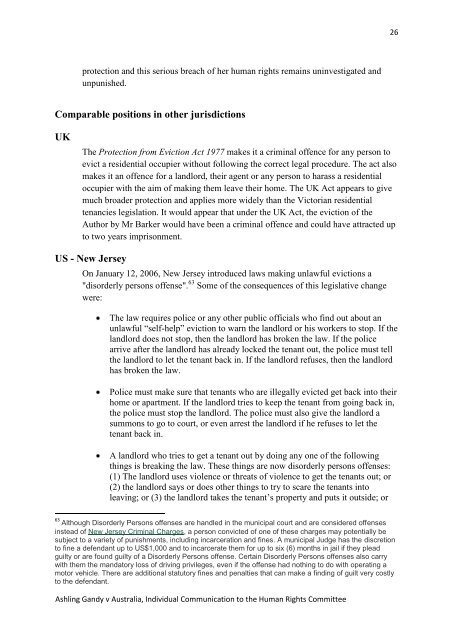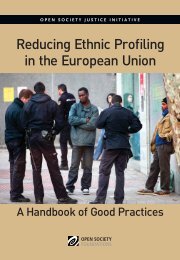individual communication to the united nations ... - Community Law
individual communication to the united nations ... - Community Law
individual communication to the united nations ... - Community Law
You also want an ePaper? Increase the reach of your titles
YUMPU automatically turns print PDFs into web optimized ePapers that Google loves.
26protection and this serious breach of her human rights remains uninvestigated andunpunished.Comparable positions in o<strong>the</strong>r jurisdictionsUKThe Protection from Eviction Act 1977 makes it a criminal offence for any person <strong>to</strong>evict a residential occupier without following <strong>the</strong> correct legal procedure. The act alsomakes it an offence for a landlord, <strong>the</strong>ir agent or any person <strong>to</strong> harass a residentialoccupier with <strong>the</strong> aim of making <strong>the</strong>m leave <strong>the</strong>ir home. The UK Act appears <strong>to</strong> givemuch broader protection and applies more widely than <strong>the</strong> Vic<strong>to</strong>rian residentialtenancies legislation. It would appear that under <strong>the</strong> UK Act, <strong>the</strong> eviction of <strong>the</strong>Author by Mr Barker would have been a criminal offence and could have attracted up<strong>to</strong> two years imprisonment.US - New JerseyOn January 12, 2006, New Jersey introduced laws making unlawful evictions a"disorderly persons offense". 63 Some of <strong>the</strong> consequences of this legislative changewere:The law requires police or any o<strong>the</strong>r public officials who find out about anunlawful “self-help” eviction <strong>to</strong> warn <strong>the</strong> landlord or his workers <strong>to</strong> s<strong>to</strong>p. If <strong>the</strong>landlord does not s<strong>to</strong>p, <strong>the</strong>n <strong>the</strong> landlord has broken <strong>the</strong> law. If <strong>the</strong> policearrive after <strong>the</strong> landlord has already locked <strong>the</strong> tenant out, <strong>the</strong> police must tell<strong>the</strong> landlord <strong>to</strong> let <strong>the</strong> tenant back in. If <strong>the</strong> landlord refuses, <strong>the</strong>n <strong>the</strong> landlordhas broken <strong>the</strong> law.Police must make sure that tenants who are illegally evicted get back in<strong>to</strong> <strong>the</strong>irhome or apartment. If <strong>the</strong> landlord tries <strong>to</strong> keep <strong>the</strong> tenant from going back in,<strong>the</strong> police must s<strong>to</strong>p <strong>the</strong> landlord. The police must also give <strong>the</strong> landlord asummons <strong>to</strong> go <strong>to</strong> court, or even arrest <strong>the</strong> landlord if he refuses <strong>to</strong> let <strong>the</strong>tenant back in.A landlord who tries <strong>to</strong> get a tenant out by doing any one of <strong>the</strong> followingthings is breaking <strong>the</strong> law. These things are now disorderly persons offenses:(1) The landlord uses violence or threats of violence <strong>to</strong> get <strong>the</strong> tenants out; or(2) <strong>the</strong> landlord says or does o<strong>the</strong>r things <strong>to</strong> try <strong>to</strong> scare <strong>the</strong> tenants in<strong>to</strong>leaving; or (3) <strong>the</strong> landlord takes <strong>the</strong> tenant‟s property and puts it outside; or63 Although Disorderly Persons offenses are handled in <strong>the</strong> municipal court and are considered offensesinstead of New Jersey Criminal Charges, a person convicted of one of <strong>the</strong>se charges may potentially besubject <strong>to</strong> a variety of punishments, including incarceration and fines. A municipal Judge has <strong>the</strong> discretion<strong>to</strong> fine a defendant up <strong>to</strong> US$1,000 and <strong>to</strong> incarcerate <strong>the</strong>m for up <strong>to</strong> six (6) months in jail if <strong>the</strong>y pleadguilty or are found guilty of a Disorderly Persons offense. Certain Disorderly Persons offenses also carrywith <strong>the</strong>m <strong>the</strong> manda<strong>to</strong>ry loss of driving privileges, even if <strong>the</strong> offense had nothing <strong>to</strong> do with operating amo<strong>to</strong>r vehicle. There are additional statu<strong>to</strong>ry fines and penalties that can make a finding of guilt very costly<strong>to</strong> <strong>the</strong> defendant.Ashling Gandy v Australia, Individual Communication <strong>to</strong> <strong>the</strong> Human Rights Committee
















